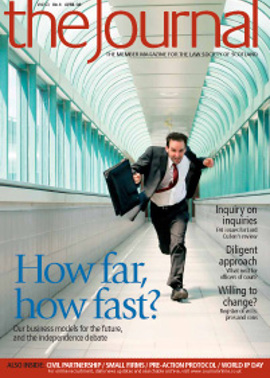Big leap forward

The profession I joined 30 years ago was different in so many ways to the one we see today. Yet significant similarities remain. The commitment to providing excellence in the delivery of legal services to clients was as strong then as now. So too the attachment to our core values: justice and the rule of law, integrity, honesty, independence, impartiality and confidentiality .
But while key areas of common concern and shared responsibility bind solicitors together as a profession, we inevitably differ in our approaches to work, fields of specialisation and, of course, points of view. The debate over alternative business structures has often focused on what divides us rather than where we agree. And it is certainly true there has been a robust exchange of views on all sides. But the purpose of that debate, at least as far as the Society is concerned, has always been to establish the best way forward for solicitors and their clients.
The ABS working group, which involved all sectors of the profession – large and small firms, urban and rural, in-house lawyers and Society staff – has put in a huge effort to take this issue forward, meeting regularly and staging a number of well-attended events. Part of that work involved the launch of a consultation exercise to gather the widest possible range of views. With 92 responses from individuals, firms and organisations representing around a quarter of the profession, it certainly generated considerable feedback. Following an analysis of those responses, the working group produced policy proposals that are being considered by Council this month. A policy paper will be published following Council’s discussions.
The new reality
A number of themes have emerged during this process. First, it is clear that reform of legal service provision will take place, as has been made clear by the Scottish Government. Driven by the emergence of a global market in services (not least because of a revolution in technology and communications), the arrival of non-lawyer providers, and legislative developments in England & Wales, the status quo no longer remains an option. The Society and the profession have an opportunity to remain at the heart of that reform process, and the working group is firmly of the view that we should rise to that challenge.
Secondly, the market place in which we all operate has already undergone significant, sometimes rapid, change and will continue to do so. The gap between high street and large practices is widening, as is reflected in profitability and the fact that newly qualified lawyers increasingly opt for a career in the big commercial firms. Again, the group believes there is no point in simply bemoaning that (as some of us, myself included, undoubtedly do). We need to respond to that changing reality in a positive and constructive way.
Diversify for success
The profession has gained its envied reputation for excellence by adapting, through expansion and diversification, in the 30 years I have practised. And the consultation exercise we conducted suggests there is an appetite for further change. While there was no clear consensus for any particular model, convincing arguments were put forward in favour of allowing solicitors’ firms to choose whatever business structure suited their commercial needs.
Such an option would require legislative changes as well as alterations to the Society’s own rules. However, it could allow firms to compete more effectively in the modern UK and global market place by encouraging ambition, diversity, career development and entrepreneurship. For instance, opportunities would arise to share overhead costs; achieve economies of scale; reduce fees; invest in expansion; and improve standards of service by attracting and retaining the highest quality non-lawyer staff, perhaps through share ownership options.
In turn, increased competition and reduced costs could benefit clients and the wider Scottish economy. Small and rural firms already under threat from changes to the market place might experience similar benefits, perhaps by forming one-stop shops through mergers and partnerships, or by providing online services. This trend already appears to be developing in England & Wales. Of course, reform will not bring compulsion to alter business models: firms will be free to retain their existing structures, and many will.
Preserving the core values
Having said that, the overwhelming message from the consultation was that any change should be subject to a number of important conditions. The foundation of the profession’s success to date has been a strong regulatory system: that must continue to apply to any new business structures. Likewise, the core values must be protected, service quality maintained, access to justice safeguarded, and consumer protection upheld. And all that should be achieved in a way that reflects the distinctive nature of the Scottish legal tradition and market. A great deal of work now needs to be done.
For its part, and subject to approval from Council, the Society will continue to play a leading role in developing a framework for the delivery of legal services that best suits the needs of solicitors and clients. The working group believes the Society is the right body to devise and operate any new regulatory system and will work constructively with the Scottish Government and others to that end. Government will also need to respond to the changing market by protecting and promoting fair and equal access to justice. Consequently, the funding and indeed the processes involved in securing access to justice may become an even more prominent issue in the months and years ahead.
The invitation
While it is not the job of the Society to prevent enterprise or protect uncompetitive practices, neither will we take lightly our responsibility to be fair to all sectors of the profession. Our focus for the future has shifted from examining the various business models to ensuring that the quality of legal service provision and the integrity of the solicitors’ profession are maintained, no matter what course of action is taken.
I would invite the profession, their staff and their clients to read the paper when it is published, let the working group have your comments, and work with the Society to improve our profession for all who rely on it and work within it.
A MOOD FOR CHANGE
An overview ofthe responses to the Society’s consultation “The Public Interest: Delivering Scottish Legal Services”
In total, 92 responses were received by email and letter. The majority were from legal firms of varying sizes, with the remainder coming from a range of legal and non-legal organisations.
The consultation document asked 21 questions that focused on four specific alternative business structures and the issues that surround them, either separately or collectively. Of the 92 responses received, 59 addressed either all or some of the questions directly and 33 were in the form of free text, some of which addressed themes raised by the questions.
A number of common themes were identified, with an overall support for some change from the status quo. The majority of respondents noted that any change would need to take into account the following:
- that any new structures are regulated effectively;
- that the independence of the solicitors’ profession is protected;
- that core values are upheld;
- that access to justice is not negatively affected – this was clearly very important to members of the Society;
- that appropriate consumer safeguards are in place.
Some responses expressed concerns that unless more flexible business structures are permitted it will make it harder for Scottish law firms to flourish and offer a competitive product in a modern environment. If the Scottish legal profession cannot respond to new demands it risks the accelerated entry into the market of other, possibly unregulated, providers.
At a time when the Legal Services Act will permit alternative business structures in England & Wales, a failure to modernise the delivery of Scottish legal services risks a flight of business from Scotland. Some fear that if there is significantly greater freedom to operate effectively in England & Wales, a move away from Scotland of more talented young lawyers could result.
The current statutory restrictions are as unacceptable to many within the legal profession in Scotland as they are to the Scottish Government and the Office of Fair Trading.
Particular issues
The consultation gave further key messages in relation to the following issues:
- Guarantee Fund and Master Policy. There was an overall consensus that if alternative business structures are introduced into the legal services market, the Guarantee Fund and the Master Policy could not be expected to remain unchanged.
- Resolution of regulatory conflict. The overall view was that it would be necessary to devise an appropriate and rigorous regulatory framework before any changes are implemented.
- Non-solicitor partners/external shareholders. There was an overall consensus that there should be a “fitness to own” test for non-solicitor partners and external shareholders, although many respondents commented that it would be difficult to formulate.
Respondents thought that some kind of charge should be levied on external shareholders. The main reason cited was to meet increased regulation costs.
Core values
It was the overwhelming view of the responses to the consultation that change must be accompanied by appropriate regulation to protect the core values of the Scottish legal profession and to ensure that there is a fair and equal playing field for all legal service providers in Scotland. There is also a strong view that the Society and its Code of Conduct are fundamental to any system of appropriate regulation.
The consultation responses do not represent a consensus view, or point to any one conclusive course of action. Rather, the focus seems to be on making sure that the quality of legal services provision and the integrity of the solicitors’ profession is maintained regardless of the course of action taken.
It should be noted however that while some responses indicated that these fundamental principles could not be upheld if alternative business structures are to be permitted, a wide range of suggestions were made about how this could be achieved.
SOME COMMENTS FROM THE RESPONSES
“The key requirement should be to preserve the rule of law and the core values of the legal profession, in both cases to serve the best interests of Scottish society… We do not believe, however, that ring fencing the legal profession from change is the way forward.”
“The brand ‘solicitor’, we suggest, is itself embedded in values such as integrity, reliability, value and quality of service.”
“We agree with the fundamental principles identified by the Society in its [consultation] paper and concur that these principles must lie at the heart of any change that takes place.”
In this issue
- Thinking ahead
- A line too often crossed
- Big leap forward
- Independence: still viable?
- FAIs: a new lease of life
- ARTL: Turquoise is in the pink
- Summary trials: deciding the facts
- Life at the sharp end
- Conscience and public service
- Wills and ways
- Achieving "senior" rates?
- CPD: the way forward
- Life on the edge
- Pre-action protocol for industrial disease claims
- Fit a doin'?
- Same difference
- Curiosity corner
- System? What system?
- Reviewing appeals
- Testing insolvency
- Scottish Solicitors' Discipline Tribunal
- Website reviews
- Book reviews
- Day of creation
- Lawyer behind the camera
- Homing in on home reports






